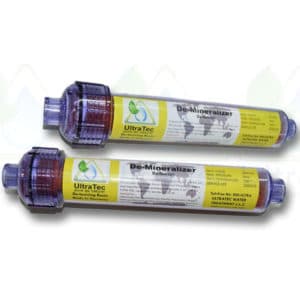A water softener functions as converting hard water into soft water by the exchange of ions. A more significant contribution of resin bed is available in a softener that resists the harshness of water so that ion exchange can occur.
So, every person will agree that the resin bed doesn’t work after a specific time. A replacement should be there so that the softener works optimally.
That’s the main reason you need the best water softener resin to ensure softness in water. Fortunately, I have already compiled a list of some of the Top water softener resins for this purpose.
Water softener resin is a crucial component of the water-softening process. It is a synthetic or natural material that filters out hard water minerals from the water, such as calcium and magnesium ions.
The resin dots have a negative charge, which attracts the positively charged hard water minerals and removes them from the water. Here are some necessary facts you need to know about water softener resin.
Types of Water Softener Resin
There are two major types of water softener resin: synthetic and natural. Synthetic resin is the most common type used in water softeners. It is made of a highly efficient polymer material to remove hard water minerals.
On the other hand, natural resin is made from a plant-based material called ion-exchange resin. It is a more eco-friendly option but is less efficient than synthetic resin.
How Water Softener Resin Works
Water softener resin works by exchanging the hard water minerals for sodium ions. The resin beads have sodium ions attached to them.
As the hard water flows via the resin tank, the calcium and magnesium ions are attracted to the resin beads and stick to them. In contrast, the sodium ions are released into the water. This process is called ion exchange.
Maintaining Water Softener Resin
To ensure your water softener resin works correctly, maintain it regularly. Here are some suggestions for keeping your water softener resin:
- Check the resin tank regularly for any signs of damage or leaks.
- Clean the resin tank at least once a year to remove any accumulated sediment or debris.
- Use high-quality salt pellets that are specifically designed for water softeners.
- Do not overload the resin tank with salt pellets.
- Regenerate the resin bed regularly to prevent mineral buildup and extend the life of the resin.
Benefits of Water Softener Resin
Here are some advantages of utilizing water-softener resin in your water-softening system.
- Softer water: Water softener resin removes the hard water minerals that cause soap scum, scale buildup, and other problems, resulting in more soothing water that suits your skin, hair, and clothing.
- Longer appliance lifespan: Soft water is less likely to cause damage to your appliances, such as washing machines, water heaters, and dishwashers, which can expand their lifespan and save you money in the long run.
- Better-tasting water: Soft water has a cleaner, fresher taste that is free from the unpleasant metallic taste of hard water.
- Energy-efficient: Soft water requires less energy to heat, which can reduce your energy bills and carbon footprint.
Related Products
De Ionizer LAB/Aquarium Cartridge Resin-MX-1
De Ionizer LAB/Aquarium Cartridge Resin-MX-1DI is Demineralization by Ionization. A DI filter removes a few mineral ions through the RO membrane, ensuring the water is as pure as possible. The DI filter also removes nitrates that are not removed by the membrane. The DI filter is a cartridge filled with an ion exchange resin in the form of small beads. When the water passes by the beads, the minerals and other ions leave the water and attach to the beads.


